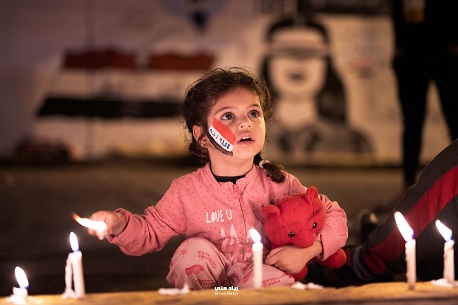ERBIL, Kurdistan Region – Iraqi families continue to grieve for their dead while Iraqi politicians busy themselves condemning US calls for snap elections and an end to violence against protesters.
Since the start of the nationwide protests in Iraq on October 1, at least 319 protesters and members of the security forces have died and around 15,000 others have been wounded, according to the Parliamentary Human Rights Committee.
Hundreds of families have lost beloved relatives during the protests.
Tahrir Square, the focal point of the protests in the Iraq’s capital of Baghdad, has become a scene of mourning as the families of the dead light candles and pray for those killed.
Protests in Iraq started on October 1 against corruption, lack of basic services, and unemployment in Baghdad before it spreads to the southern parts of the country.
However, they were met with deadly force, including the fire of live ammunition rounds and tear gas. Protests paused on October 8 as the Shiite religious pilgrimage of Arbaeen approached.
A second wave of protests began on October 25. In response to the violence enacted during the first wave of demonstrations, protesters upped the ante and demanded the overthrow of the government, a change of Iraq’s system to a presidential one, and the amendment of the 2005 constitution, among other demands.
In this video sourced from the messaging application Telegram, an elderly woman is seen transporting her son's body for burial.
“I lost my son for the sake of Iraq, and if we lose another one , two or even 10 million we will keep on protesting against this corrupted government, all redeem for Muqtada al-Sadr, and the Sadrist movement,” she says.
Iraqi politicians are busy responding to US statements released this week against the government crackdown on protesters.
The White House released a statement on Sunday calling on the Iraqi government to “halt the violence against the protesters,” and also meet the demand of the protesters by holding “early elections.”
Two days later, the US Secretary of State, Mike Pompeo had a phone call with the Iraqi Prime Minister, Adil Abdul-Mahdi, in which he urged the Iraqi PM to “protect the protesters and to address their legitimate grievances.”
“The Secretary deplored the death toll among the protesters as a result of the Government of Iraq’s crackdown and use of lethal force, as well as the reports of kidnapped protesters. Secretary Pompeo urged Prime Minister Abd al-Mahdi to take immediate steps to address the protesters’ legitimate grievances by enacting reforms and tackling corruption,” according to a US State Department readout.
Despite the difference of opinion between rival Iraqi blocs, many were united in their rejection of the US statement.
Iranian-backed Islamic movements in Iraq have released statements accusing Washington of interfering in Iraq’s internal issues and affairs.
Iranian-backed Kataab Hezbollah militia released a statement on Tuesday calling on expelling the US ambassador in Baghdad and closing the US embassy in the capital city of Iraq.
“US has been interfering in Iraq’s issues in order to spread chaos and instability by creating unrest,” the statement read. “We ask to expel the US ambassador and close the US embassy in Baghdad.”
Muqtada al-Sadr, firebrand Shiite cleric in Iraq and head of the biggest bloc in Iraqi parliament Sairoon coalition, tweeted on Monday that US interference in Iraq’s issues is “refused by Iraqis and Iraqis are capable to decide on their fate and country by themselves without the interference from US or the others.”
In the tweet, Sadr described the US as “invaders.”
Qais al-Khazali, the secretary general of Asaib Ahl al-Haq, a Hashd al-Shaabi unit, said in a Monday tweet that “The White House statement revealed the extent of American intervention in Iraqi affairs, and it is a proof that the early elections project is mainly an American project."
Hashd al-Shaabi is the Arabic term for the Popular Mobilization Forces (PMF), which are also linked to Tehran.











Comments
Rudaw moderates all comments submitted on our website. We welcome comments which are relevant to the article and encourage further discussion about the issues that matter to you. We also welcome constructive criticism about Rudaw.
To be approved for publication, however, your comments must meet our community guidelines.
We will not tolerate the following: profanity, threats, personal attacks, vulgarity, abuse (such as sexism, racism, homophobia or xenophobia), or commercial or personal promotion.
Comments that do not meet our guidelines will be rejected. Comments are not edited – they are either approved or rejected.
Post a comment